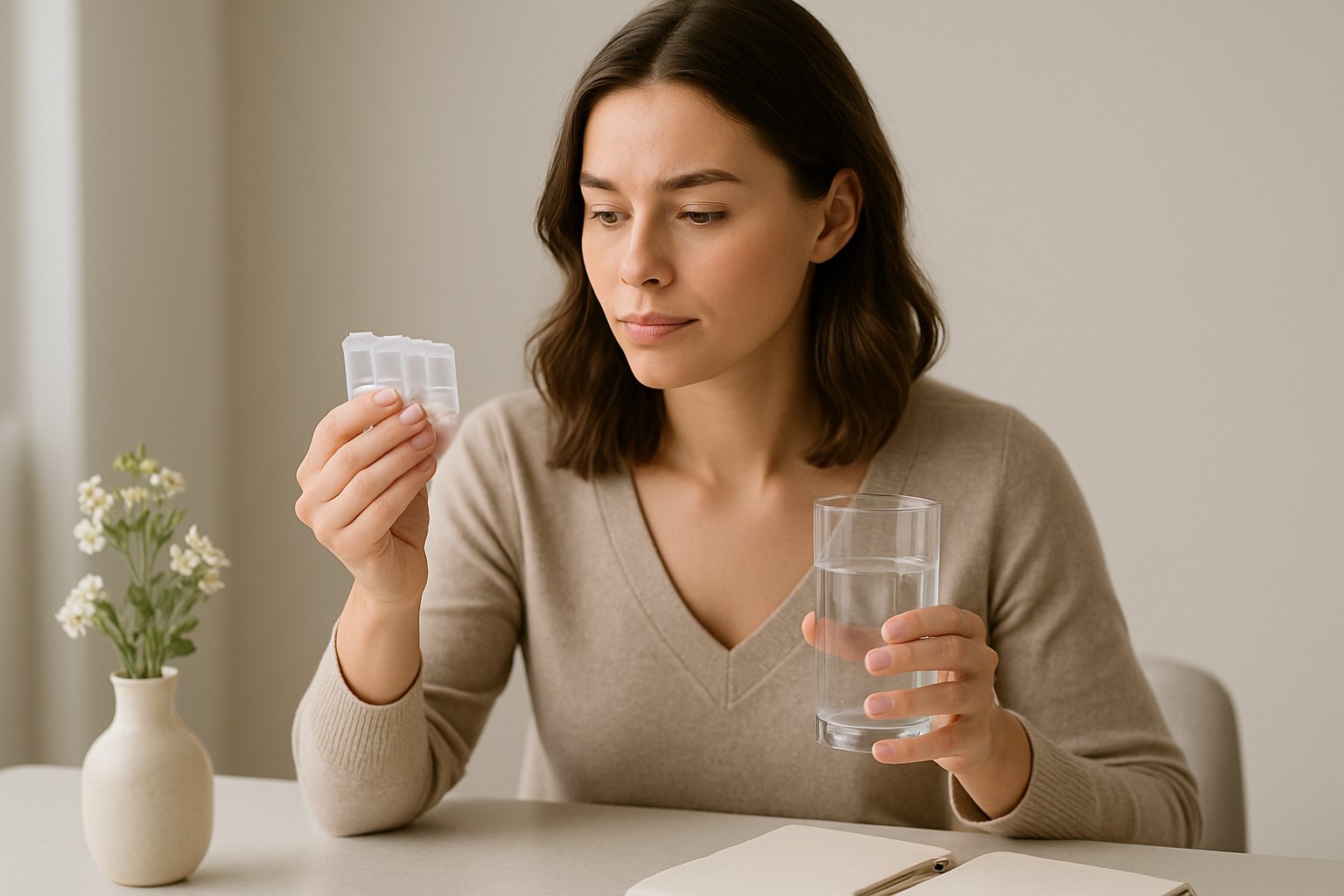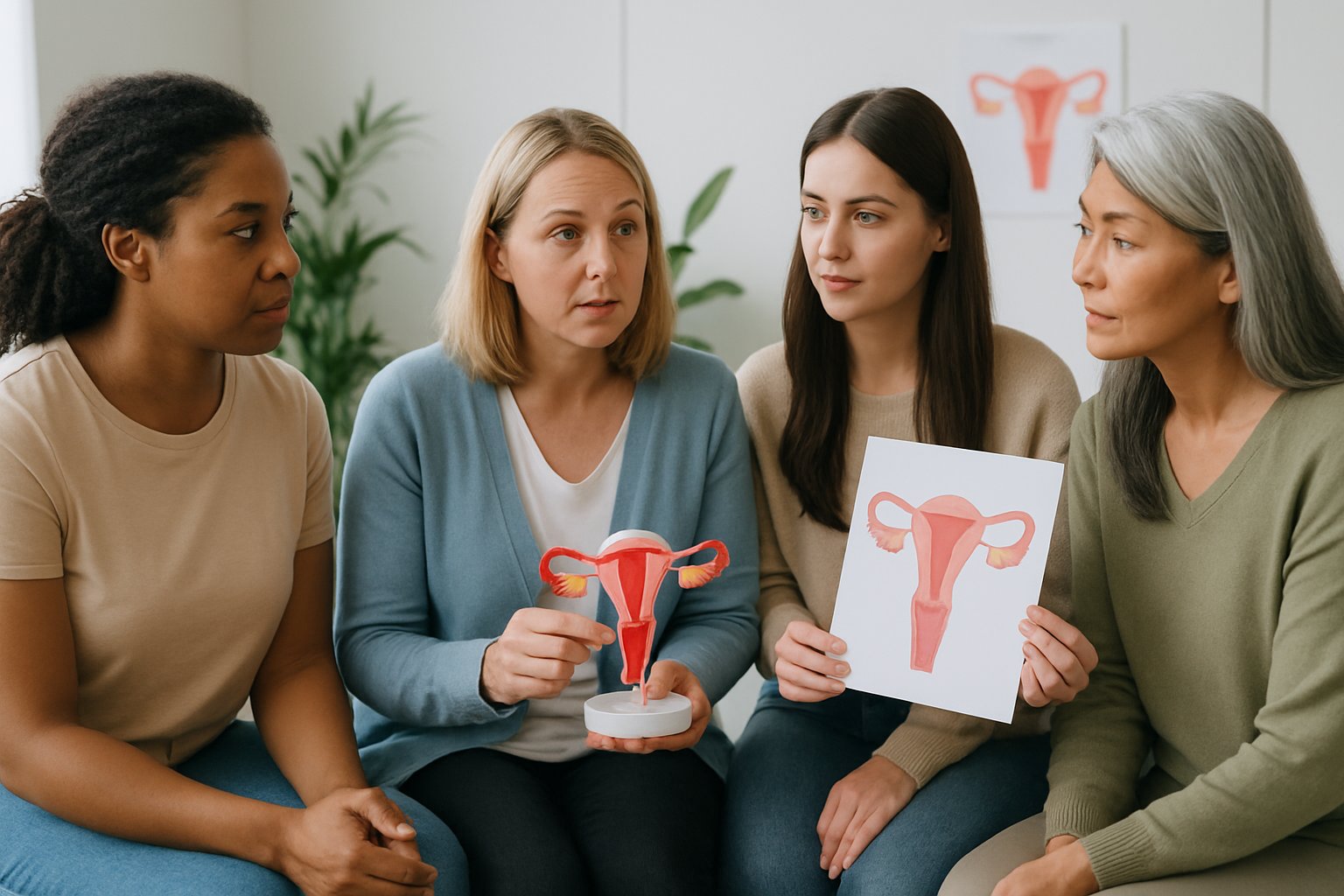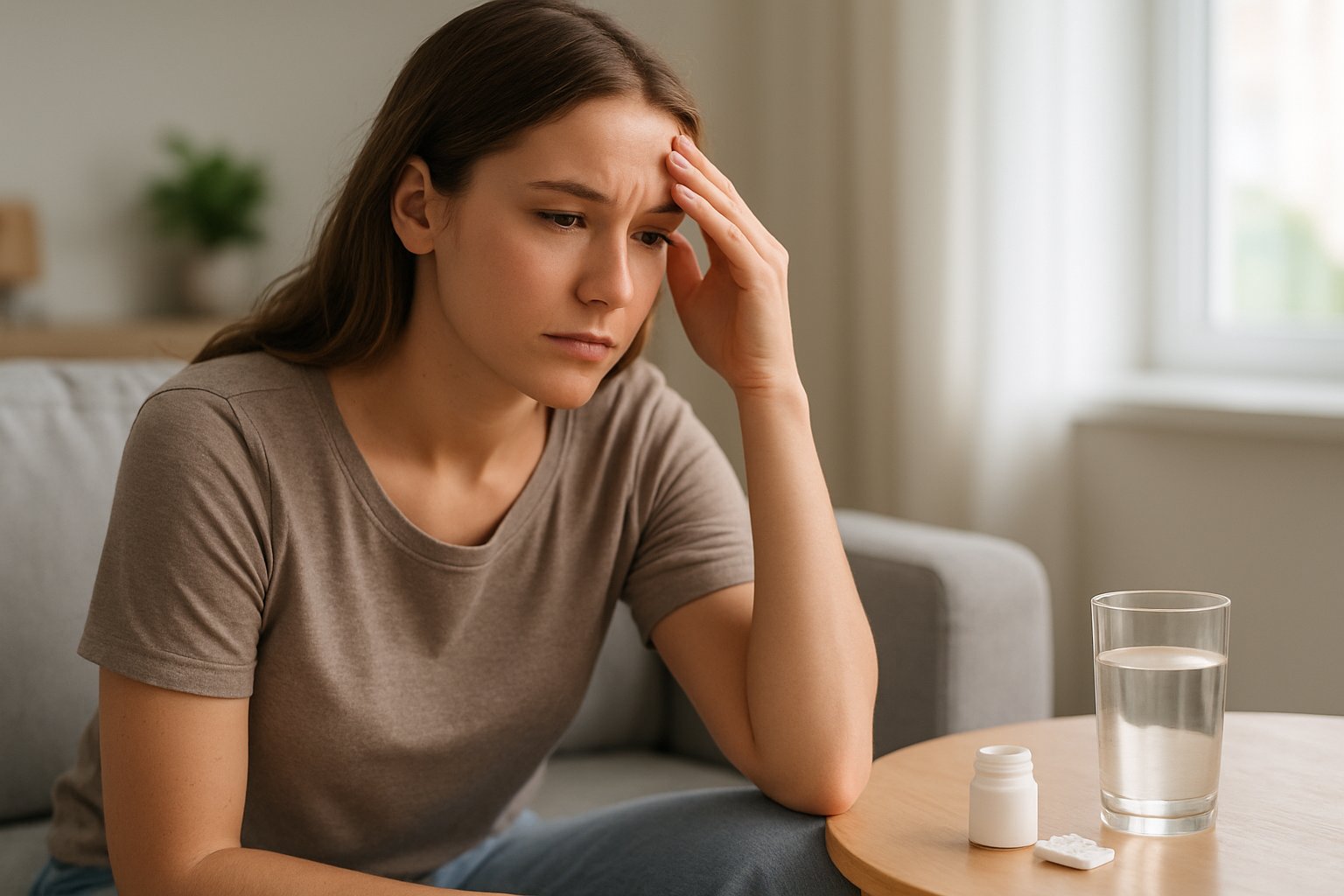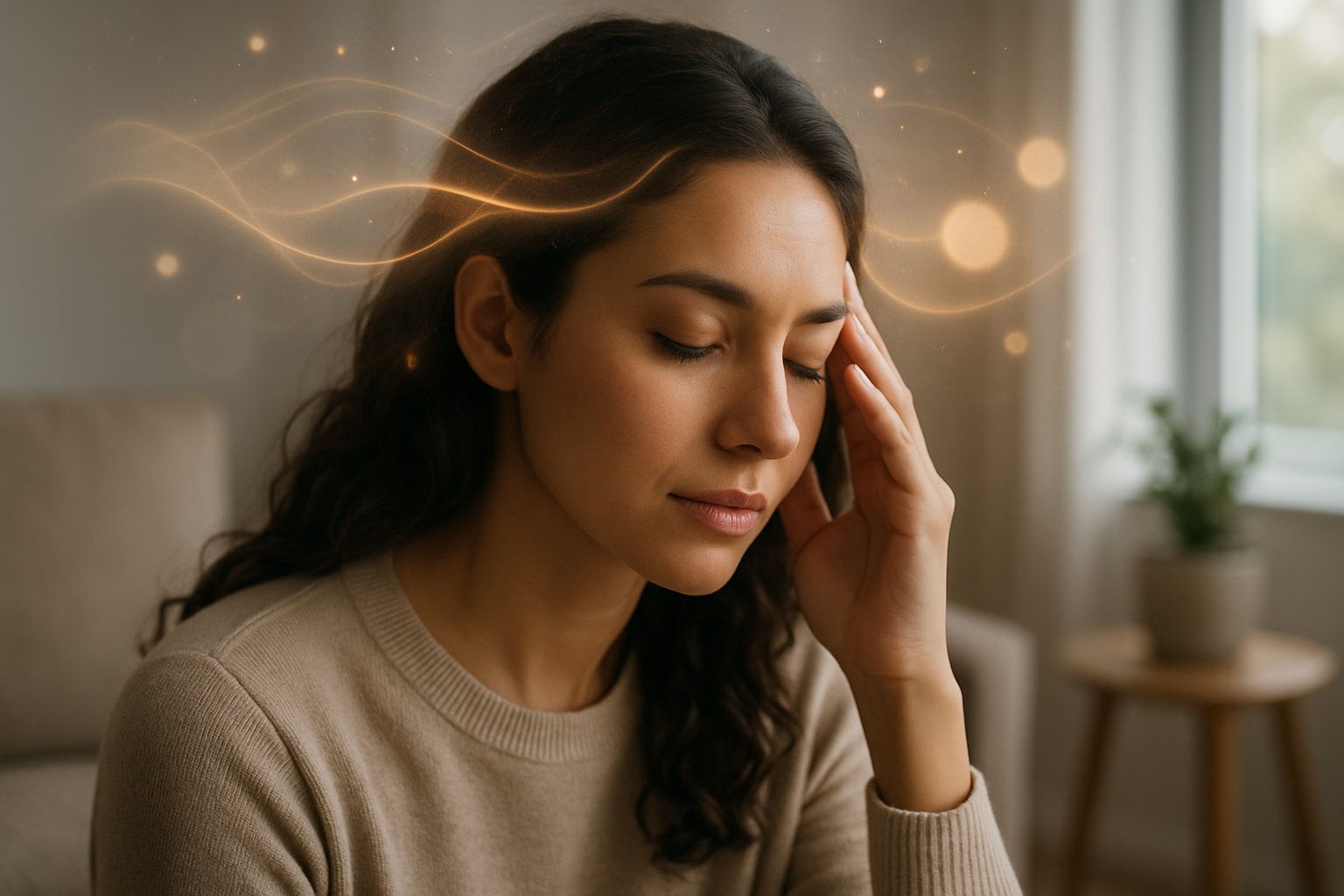Stopping birth control triggers significant changes in your body as hormone levels shift back to their natural state. Whether you’ve been taking the pill, using an IUD, or relying on another form of hormonal contraception, your body will need time to readjust.

When you stop using hormonal birth control, your natural hormone production resumes within a few weeks, but it can take several months for your body to fully regulate. The changes you experience depend on factors like the type of birth control you used, how long you were on it, and your individual body chemistry.
Understanding what to expect can help you prepare for this transition. From changes in your menstrual cycle to shifts in mood, skin, and fertility, stopping birth control affects your body[1] in multiple ways that are important to recognize.
Key Takeaways
- Your hormones will fluctuate as your body adjusts to producing them naturally again
- Period changes, acne, and mood shifts are common side effects during the transition
- Most people can get pregnant right after stopping birth control, so alternative protection is needed if pregnancy isn’t desired
How Stopping Birth Control Affects Your Body

When you stop using hormonal contraception, your body goes through significant changes as it adjusts to the absence of synthetic hormones. The timeline and intensity of these changes vary depending on the type of birth control method you used and your individual hormone levels.
Hormonal Fluctuations and Withdrawal
Your body experiences immediate hormonal shifts when you stop taking birth control pills or remove other hormonal contraceptives. Hormonal birth control affects estrogen and progestin levels[1], which regulate your menstrual cycle and other bodily functions.
Estrogen withdrawal causes the most noticeable changes. This hormone suppresses ovulation while you’re on combination birth control. When estrogen levels drop suddenly, it triggers various physical and emotional responses.
Progestin withdrawal also impacts your body significantly. This synthetic form of progesterone thickens cervical mucus and thins the uterine lining. Without it, your natural progesterone production must resume.
Common withdrawal symptoms include:
- Spotting or breakthrough bleeding
- Mood swings and irritability
- Headaches or migraines
- Breast tenderness changes
- Sleep pattern disruptions
Many women experience hormone withdrawal bleeding within 2-3 days of stopping their contraception. This differs from a regular period because it results from hormone level changes rather than natural ovulation.
Timeline for Hormone Adjustment
The speed of hormone adjustment depends on your birth control method and individual factors. Most hormonal contraceptives clear your system relatively quickly, but natural hormone production takes longer to normalize.
Birth control pills typically leave your system within 24-48 hours. However, ovulation usually returns within a couple of weeks[1] after stopping oral contraceptives.
IUDs and implants have different timelines. Hormonal IUDs release small amounts of progestin locally, so adjustment may be faster. The contraceptive implant can take several weeks for hormone levels to normalize completely.
Depo-Provera injections take the longest to clear. This long-acting contraception can delay ovulation for months after your last shot. Some women don’t ovulate normally for 12-18 months after stopping injections.
Your menstrual cycle typically regulates within 3 months of stopping most hormonal contraceptives. If periods don’t return by this point, consult your healthcare provider about possible underlying issues.
Differences by Birth Control Type
Combination birth control (containing both estrogen and progestin) typically causes more dramatic changes when discontinued. These methods include most birth control pills, the patch, and vaginal rings.
Users often experience more intense withdrawal symptoms because their bodies must readjust to producing both estrogen and progesterone naturally.
Progestin-only methods generally cause milder withdrawal effects. These include the mini-pill, hormonal IUDs, implants, and Depo-Provera shots. Since they don’t contain estrogen, the hormonal shift is less dramatic.
Intrauterine devices vary significantly:
- Copper IUDs cause minimal changes since they’re hormone-free
- Hormonal IUDs may cause lighter withdrawal symptoms due to localized hormone delivery
Long-acting methods like implants and injections often have prolonged adjustment periods. Your body needs more time to resume normal hormone production after extended suppression.
The specific brand and hormone dosage also influence your experience. Higher-dose contraceptives typically cause more noticeable changes when stopped compared to low-dose options.
Menstrual and Ovulation Changes After Stopping Birth Control

Your menstrual cycle and ovulation typically return within weeks of stopping hormonal birth control, though the timeline and experience vary by person. Expect some irregular periods and cycle changes as your body adjusts to natural hormone fluctuations again.
Return of Menstruation
Most women experience spotting or bleeding within two days[1] after stopping hormonal birth control. This initial bleeding is withdrawal bleeding, not a true period.
The first real menstruation usually starts within 2-8 weeks after stopping birth control. However, timing depends on the type of contraceptive used.
Timeline by Birth Control Type:
- Pills, patch, ring: 2-4 weeks
- Hormonal IUD: 1-6 weeks
- Birth control shot: 3-18 months
- Implant: 1-3 months
Women who used long-acting methods like the shot may wait longer for their periods to return. The synthetic hormones take more time to clear from the system.
Cycle Irregularities
Your cycle may be irregular[1] after stopping birth control. The cycle length might change completely from what it was before.
Some women experience longer or shorter cycles for the first few months. Others may skip periods entirely or have them more frequently than expected.
Common irregularities include:
- Cycles longer than 35 days
- Cycles shorter than 21 days
- Missing periods for 2-3 months
- Unpredictable timing
Most menstrual irregularities resolve within 3-6 months. If periods don’t regulate after three months, consult a healthcare provider about possible post-pill amenorrhea.
Possible Changes in Cramping and Flow
Period symptoms that existed before birth control often return after stopping. Women who had heavy or painful periods may experience these issues again.
Birth control typically reduces menstrual flow and cramping. Without these hormones, periods may become heavier and more uncomfortable than they were while on contraceptives.
Potential changes include:
- Heavier bleeding
- Longer periods (5-7 days vs 3-5 days)
- More intense cramping
- Return of PMS symptoms
However, some women find their periods are less severe than before starting birth control. Age and lifestyle changes during the time on birth control can influence menstrual symptoms.
Ovulation and Fertility Restoration
Ovulation typically resumes within 1-3 weeks after stopping most forms of hormonal birth control. This means pregnancy becomes possible almost immediately after discontinuation.
Women using the birth control shot may not ovulate for several months after their last injection. The synthetic hormones suppress ovulation longer than other methods.
Fertility restoration timeline:
- Most methods: 1-3 cycles
- Birth control shot: 6-18 months
- Age factors: May take longer after age 35
Family planning becomes important immediately after stopping birth control. Women who don’t want to conceive should start alternative contraception right away. Those trying to conceive can begin immediately, though a fertility specialist may recommend waiting 1-2 cycles to establish regular ovulation patterns.
Physical Symptoms and Side Effects

Your body may experience several noticeable changes when you stop taking hormonal birth control. These physical symptoms typically include skin breakouts, weight changes, breast discomfort, and headache patterns that differ from what you experienced while on birth control.
Skin Changes and Acne Flare-Ups
Stopping birth control often triggers skin changes[2], with acne being one of the most common issues. When women take birth control pills, testosterone levels drop, which helps keep breakouts under control.
Once they stop taking the pill, testosterone levels rise back to their natural state. This hormonal shift frequently leads to hormonal acne appearing on the face, chest, and back.
The severity of acne flare-ups depends largely on skin condition before starting birth control. Women who originally began taking birth control to manage acne problems will likely see those same issues return.
For those who didn’t have acne problems before birth control, the breakouts are usually temporary. The skin typically adjusts within 3-6 months as hormone levels stabilize.
Hair growth patterns may also change during this adjustment period. Some women notice increased facial hair or body hair as androgen levels return to their pre-birth control baseline.
Weight Fluctuations
Weight changes affect about two-thirds of women[3] who stop taking birth control, though the direction varies significantly. Research shows equal numbers of women experience weight gain, weight loss, or no change at all.
Water weight accounts for most immediate weight fluctuations. Birth control pills can cause water retention, so stopping them often leads to a few pounds of water weight loss within the first few weeks.
Any weight changes related to fluid retention are typically temporary. True fat loss or gain depends more on diet, exercise, and individual metabolism than stopping birth control.
Women should expect their weight to stabilize within 2-3 months as their body adjusts to natural hormone cycles. Dramatic or persistent weight changes warrant discussion with a healthcare provider.
Breast Tenderness and Bloating
Breast tenderness often changes when stopping hormonal contraceptives. Some women experience increased sensitivity and soreness as their natural hormone cycles resume.
The synthetic hormones in birth control affect breast tissue directly. Without these artificial hormones, breasts may feel different in size, shape, or sensitivity throughout the menstrual cycle.
Bloating patterns typically shift as well. Many women notice less consistent bloating since their natural hormone fluctuations create different water retention patterns than synthetic hormones.
These symptoms usually follow the natural menstrual cycle once it returns. Breast tenderness often peaks before periods, while bloating may occur mid-cycle or before menstruation begins.
Most breast and bloating symptoms stabilize within three menstrual cycles after stopping birth control.
Headaches and Migraines
Headache patterns often improve after stopping birth control, especially for women prone to migraines. The artificial hormones in birth control can trigger headaches due to the steep drop in estrogen during placebo weeks.
Women with migraine histories may notice fewer episodes once they stop taking hormonal contraceptives. The steady hormone levels from natural cycles are often less triggering than the artificial hormone fluctuations from pills.
However, some women experience temporary headaches during the first few months as their body adjusts. These adjustment headaches typically decrease as natural hormone production stabilizes.
Migraines linked to natural hormonal changes may return once regular menstrual cycles resume. Women who had hormone-related migraines before birth control should expect similar patterns to return.
Emotional and Mental Health Effects

Stopping birth control can trigger significant changes in mood, energy, and premenstrual symptoms as hormone levels fluctuate. Many women experience anxiety, mood swings, and fatigue during the transition period while their bodies readjust to natural hormone production.
Mood Swings and Anxiety
Emotional changes after stopping birth control[4] are common as the body readjusts to natural hormone fluctuations. The brain and ovaries need time to resume normal communication after being suppressed by synthetic hormones.
Women may experience heightened anxiety, panic attacks, or depressive episodes during the first few months. These mood changes occur because the body has been dealing with inflammation, blocked ovulation, and nutrient depletion while on birth control.
Anxiety after stopping birth control[5] can manifest as:
- Racing thoughts or worry
- Physical symptoms like rapid heartbeat
- Sleep disturbances
- Irritability or emotional sensitivity
The severity varies based on how long someone used birth control and their individual hormone sensitivity. Most mood-related symptoms improve within 3-6 months as hormone levels stabilize.
Fatigue and Energy Levels
Birth control pills deplete essential nutrients needed for energy production. This creates a cycle where fatigue after stopping birth control[6] initially worsens before improving.
The pill interferes with hormones that regulate energy and motivation. Many women feel tired more often and struggle with afternoon energy crashes during the transition period.
Common fatigue symptoms include:
- Morning sluggishness
- Difficulty concentrating
- Physical exhaustion despite adequate sleep
- Reduced motivation for daily activities
Energy levels typically begin improving after 2-4 months. Some women report better energy than they had while on birth control once their natural hormone production resumes.
Premenstrual Syndrome and PMDD
PMS symptoms often return or intensify when stopping birth control, especially for women who originally started it to manage these issues. The sudden hormone changes can trigger more severe premenstrual symptoms than experienced before.
Women with a history of premenstrual dysphoric disorder may see symptoms return within the first few cycles. PMDD involves severe mood changes, anxiety, and physical symptoms that significantly impact daily functioning.
Returning PMS symptoms may include:
- Mood irritability and depression
- Breast tenderness and bloating
- Food cravings and appetite changes
- Sleep disruption and fatigue
These symptoms typically stabilize within 3-6 months as the menstrual cycle regulates. Women who had irregular periods before birth control may take up to six months to see improvement in premenstrual symptoms.
Sexual and Reproductive Health Changes

Stopping birth control affects libido and sexual desire through hormonal shifts. Many underlying reproductive conditions may also return after discontinuing hormonal contraception.
Libido and Sexual Desire
Libido changes vary significantly[2] depending on the type of birth control previously used. Some women experience increased sexual desire after stopping, while others notice a decrease.
Birth control type affects sexual function differently:
- Implants: Often cause negative effects on libido
- Levonorgestrel IUDs: Usually create positive changes in sexual desire
- Rings and injections: Produce mixed results
Hormonal changes play the biggest role in these shifts. Birth control suppresses natural hormone production, including testosterone, which affects sexual desire.
When women stop taking hormonal contraception, their natural hormone cycles resume. This process can take several months to stabilize completely.
Some women notice their sexual desire returns to pre-birth control levels within weeks. Others may experience temporary fluctuations as their bodies adjust to hormonal changes.
Return of Symptoms from Underlying Conditions
Women with PCOS often see symptoms return after stopping birth control. These include irregular periods, excess hair growth, and hormonal imbalances.
Endometriosis symptoms frequently come back when hormonal contraception ends. Pain during menstruation and sexual activity may increase as natural hormone cycles resume.
Birth control often masks underlying reproductive health issues. Without hormonal suppression, conditions like severe PMS and heavy menstrual bleeding typically return.
Common returning symptoms include:
- Painful or irregular periods
- Hormonal acne flare-ups
- Excessive hair growth on face or body
- Pelvic pain during sexual activity
Women should expect these changes within 3-6 months of stopping birth control. Consulting a healthcare provider helps manage returning symptoms effectively.
Next Steps and Consulting a Healthcare Professional

Stopping birth control requires careful planning and medical guidance to ensure a safe transition. Professional support helps address potential complications and assists with family planning decisions or alternative contraception choices.
When to Seek Medical Advice
Women should consult their healthcare professional before stopping birth control, especially if they have underlying health conditions. Those with high blood pressure or other cardiovascular issues need medical supervision during the transition.
Immediate medical attention is necessary if severe symptoms develop after discontinuing hormones. These include persistent heavy bleeding, severe mood changes, or significant acne outbreaks.
Healthcare providers can assess individual risk factors and recommend the safest approach. They may suggest gradually reducing hormone doses rather than stopping abruptly.
Women who experience irregular periods for more than three months after stopping should schedule a consultation. A fertility specialist may be needed if conception attempts are unsuccessful after six months of trying.
Planning for Pregnancy or Alternative Contraception
Family planning discussions with healthcare providers help determine the best timing for pregnancy attempts. Most women can conceive within three months of stopping hormonal contraception.
Those not ready for pregnancy need immediate alternative protection. Barrier methods like condoms provide instant contraception without hormonal effects.
The Guttmacher Institute reports that unplanned pregnancies often occur during contraception transitions. Healthcare professionals can recommend appropriate alternatives based on lifestyle and health factors.
Copper IUDs offer long-term protection without hormones. Diaphragms and cervical caps require fitting by medical professionals but provide hormone-free options.
Considerations for Long-Term Health
Healthcare providers assess how stopping birth control affects long-term health goals. Women approaching menopause may need different guidance than those in their reproductive years.
Bone health monitoring becomes important for women who used hormonal methods for extended periods. Some birth control methods provide protective benefits that end upon discontinuation.
Regular check-ups help track how the body adjusts to natural hormone cycles. Healthcare professionals can address concerns about acne, weight changes, or mood fluctuations.
Women who started birth control during puberty may experience unfamiliar natural cycles. Medical guidance helps distinguish between normal adjustment and concerning symptoms requiring intervention.
Blood pressure monitoring remains important for women who had elevated readings while using hormonal contraception.
Frequently Asked Questions

Most people experience temporary side effects like period changes, acne, and hair loss when stopping birth control. Side effects of stopping birth control[7] typically resolve on their own within a few months as hormones rebalance.
What are common side effects after discontinuing the use of the pill?
The most common side effects include period changes, acne breakouts, and temporary hair loss. Some people experience migraines due to estrogen withdrawal, especially those who had headaches before starting birth control.
Period changes after stopping birth control[7] can range from heavier, longer periods to irregular bleeding. Some people may not get a period for several months.
Hair loss, known as telogen effluvium, affects people who stop birth control suddenly. This temporary condition is more common in those with family history of hair loss or existing alopecia.
PMS symptoms may return if birth control was previously helping manage them. Cramps, mood changes, and other menstrual symptoms can come back.
What positive changes might occur after stopping hormonal birth control?
Many people notice an increased sex drive after stopping birth control[7]. About 8% of users stop taking the pill because it causes low libido and vaginal dryness.
Some people experience improved mood and emotional stability. Hormonal birth control can affect mood in some users, so stopping may lead to better mental clarity.
Energy levels may increase for those who experienced fatigue while on hormonal contraceptives. Sleep patterns might also improve as hormone levels stabilize.
How should one safely discontinue the use of birth control pills?
Pills can be stopped at any time without medical supervision. There is no need to finish a full pack before discontinuing.
People should talk to a healthcare provider before stopping, especially if using birth control for medical reasons beyond pregnancy prevention. Some conditions like severe acne or painful periods may return.
Alternative contraception methods[7] should be used immediately if pregnancy prevention is still needed. Fertility can return quickly after stopping the pill.
What is the typical timeframe for hormonal rebalancing post-cessation of birth control?
Most side effects are temporary and resolve within 3-6 months. Normal menstrual cycles typically return[7] within this timeframe.
Hormone levels begin changing immediately after stopping birth control. The body starts producing its own hormones again within days to weeks.
Some effects like acne or hair loss may take several months to fully resolve. Each person’s timeline varies based on individual hormone sensitivity and how long they used birth control.
Are there any specific considerations for stopping birth control after long-term use?
Long-term users may experience more pronounced withdrawal effects. The body needs time to remember how to regulate hormones naturally after years of external control.
Fertility usually returns quickly regardless of how long someone used birth control. There is no evidence that long-term use affects future fertility once discontinued.
People who started birth control as teenagers may not know their natural cycle patterns. They should track symptoms and cycles to understand their body’s normal responses.
Medical conditions that birth control was treating may return more severely after long-term use. Healthcare providers can help manage these transitions.
What can one expect in terms of menstrual cycle normalization following the discontinuation of birth control?
The first few cycles are often irregular and unpredictable. Periods may be heavier, lighter, longer, or shorter than expected initially.
Typical menstrual cycles return after 3-6 months[7] off birth control. Some people may take up to a year to establish regular patterns.
Ovulation can begin immediately after stopping birth control. Pregnancy is possible even before the first natural period occurs.
People should seek medical attention if they have no period for six months or experience extremely painful or heavy bleeding. These symptoms may indicate underlying health issues that need treatment.
References
- 10 Possible Side Effects of Stopping Birth Control, According to Ob-Gyns. https://www.self.com/story/stopping-birth-control-changes Accessed October 20, 2025
- Stopping birth control often triggers skin changes. https://www.health.com/condition/birth-control/stopping-birth-control Accessed October 20, 2025
- Weight changes affect about two-thirds of women. https://www.womenshealthmag.com/health/a19975106/quitting-birth-control-pill/ Accessed October 20, 2025
- Emotional Changes After Stopping Birth Control: A Guide. https://neurolaunch.com/emotional-after-stopping-birth-control/ Accessed October 20, 2025
- Anxiety After Stopping Birth Control: Post Birth Control Syndrome. https://www.naturalcycles.com/cyclematters/anxiety-after-stopping-birth-control Accessed October 20, 2025
- Stopping Birth Control Side Effects. https://drbrighten.com/stopping-birth-control-side-effects/ Accessed October 20, 2025
- Side effects of stopping birth control. https://www.health.com/condition/birth-control/what-happened-when-i-went-off-hormonal-birth-control-pills Accessed October 20, 2025
